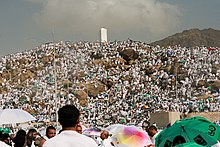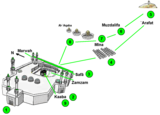Dhu al-Hijja
Dhu al-Hijjah (Arabic: ذُو ٱلْحِجَّة, romanized: Ḏū al-Ḥijja IPA: [ðu‿l.ħid͡ʒ.d͡ʒah]) is the twelfth and final month in the Islamic calendar.[1] Being one of the four sacred months during which war is forbidden, it is the month in which the Ḥajj (Pilgrimage) takes place as well as Eid al-Adha, the “Festival of the Sacrifice.”
| Dhu al-Hijja | |
|---|---|
 The Kaaba during Hajj | |
| Native name | ذُو ٱلْحِجَّة (Arabic) |
| Calendar | Islamic calendar |
| Month number | 12 |
| Number of days | 29-30 (depends on actual observation of the moon's crescent) |
| Significant days |
|
← Dhu al-Qadah Muharram → | |
The Arabic name of the month, Dhu al-Hijja, means "Possessor of the Pilgrimage" or "The Month of the Pilgrimage".[1] During this month, Muslim pilgrims from all around the world congregate at Mecca to visit the Kaaba. The Hajj rites begin on the eighth day and continue for four or five days. The Day of Arafah takes place on the ninth of the month. Eid al-Adha, the "Festival of the Sacrifice", begins on the tenth day and ends on the thirteenth day.[1]
The name of this month is also spelled Dhul-Hijja or Zu al-Hijja. In modern Turkish, the name is Zilhicce also spelled as Zilhacce.[1]
| Islamic calendar |
|---|
| Months |
|
Timing
The Islamic calendar is a lunar calendar, and months begin when new moon is sighted. Since the Islamic lunar calendar year is 11 to 12 days shorter than the solar year, Dhu al-Hijja migrates throughout the seasons. The estimated start and end dates for Dhu al-Hijja, based on the Umm al-Qura calendar of Saudi Arabia, are:[2]
| AH | First day (CE/AD) | Last day (CE/AD) |
|---|---|---|
| 1443 | 30 June 2022 | 29 July 2022 |
| 1444 | 19 June 2023 | 18 July 2023 |
| 1445 | 07 June 2024 | 06 July 2024 |
| 1446 | 28 May 2025 | 25 June 2025 |
| 1447 | 18 May 2026 | 15 June 2026 |
Special days
- The 8th, 9th,10th, 11th, 12th, and 13th day of Dhu al-Hijja as the days of Hajj
- The 9th of Dhu al-Hijja as the Day of Arafah
- Eid al-Adha on the 10th of Dhu al-Hijja
- Eid al-Ghadeer on the 18th Dhu al-Hijja

Mention in Hadith
According to Hadith, great rewards have been mentioned for performing certain Islamic rituals on specific days of Dhu al-Hijja:
One of the wives of Muhammad said: "Allah's Messenger used to fast the [first] nine days of Dhul-Hijjah, the day of 'Ashurah, and three days of each month."[3]
The Prophet said: "There are no days more beloved to Allah that He be worshipped in them than the ten days of Dhu al-Hijjah, fasting every day of them is the equivalent of fasting a year, and standing every night of them (in prayer) is the equivalent of standing on the Night of Qadr."[4]
Abu Qatada narrates that Muhammad was asked about fasting on the Day of Arafah. He said: as for the fasting on the Day of Arafah, I anticipate that Allah will forgive the year (i.e. the sins of the year) after it and the year before it.[5]
General events
Sunni
- 18 Dhu al-Hijja, assassination of Uthman, the prominent companion and son-in-law of Muhammad and Khadija. Husband of Ruqayyah and Umm Kulthum.
Shi'ite
- 01 Dhu al-Hijja, Nikah (marriage) of Ali and Fatimah – AH 2 (24 February AD 624).
- 07 Dhu al-Hijja, martyrdom of Twelver and Ismāʿīlī Shīʿite Imām, Muhammad al-Bāqir ‐ AH 114.
- 08 Dhu al-Hijja, Husayn ibn ʿAlī began his journey to Karbalāʾ from Mecca.
- 09 Dhu al-Hijja, martyrdom of Muslim ibn ʿAqīl and Hani ibn Urwah in Kufah. It is also a day of supererogatory fasting – AH 60.
- 15 Dhu al-Hijja, birth of Twelver Imām, ʿAlī al-Naqī - AH 214 [Disputed date].
- 18 Dhu al-Hijja, Shīʿite Muslims celebrate the event of Ghadir Khumm - AH 10.
- 19 Dhu al-Hijja, Fatimah went to Ali's house after their marriage.
- 23 Dhu al-Hijja, martyrdom of Meesam Tammar, friend of Ali – AH 60.
- 23 Dhu al-Hijja, martyrdom of two sons of Muslim ibn ʿAqīl in Kufa - AH 60.
- 24 Dhu al-Hijja, event of al-Mubahalah took place ('Eid al-Mubahilah).
- 24 Dhu al-Hijja, some historians mention that the Hadith, Ahl al-Kisa', event was also on the same day prior to Muhammad setting out for Mubahila.
- 24 Dhu al-Hijja, supplication day and giving of alms with the ring by Ali. In reply verse, "Verily your Walee is Allah; and His Messenger and those who establish Salaat, and pay Zakaat while they be in Rukooʿ. (Maa-Idah: 55)" was revealed.
- 25 Dhu al-Hijja, Sura Al-Insan or Hal Ata, or Dahar, which records the giving of alms to orphans, the destitute and travellers by Fatimah Hasan and Husain was revealed.
- 25 Dhu al-Hijja, Ali becomes the Caliph of Islam – AH 35.[citation needed]
Notes
References
- ^ a b c d Yaşaroğlu, M.Kâmil (2013). "ZİLHİCCE". TDV Encyclopedia of Islam, Vol. 44 (Yusuf – Zwemer) (in Turkish). Istanbul: Turkiye Diyanet Foundation, Centre for Islamic Studies. pp. 415–416. ISBN 978-975-389-785-3.
- ^ Umm al-Qura calendar of Saudi Arabia
- ^ "Ten Blessed Days of Dhul Hijjah | Soul". Central-mosque.com. Archived from the original on 2013-09-28. Retrieved 2013-09-26.
- ^ "Jami` at-Tirmidhi 758 - The Book on Fasting - كتاب الصوم عن رسول الله صلى الله عليه وسلم - Sunnah.com - Sayings and Teachings of Prophet Muhammad (صلى الله عليه و سلم)". sunnah.com. Retrieved 2024-06-15.
- ^ "Sahih Muslim 1162b - The Book of Fasting - كتاب الصيام - Sunnah.com - Sayings and Teachings of Prophet Muhammad (صلى الله عليه و سلم)". sunnah.com. Retrieved 2024-06-15.
External links
- Islamic-Western Calendar Converter (based on the Arithmetical or Tabular Calendar).
- Hadith on Dhul-Hijjah












